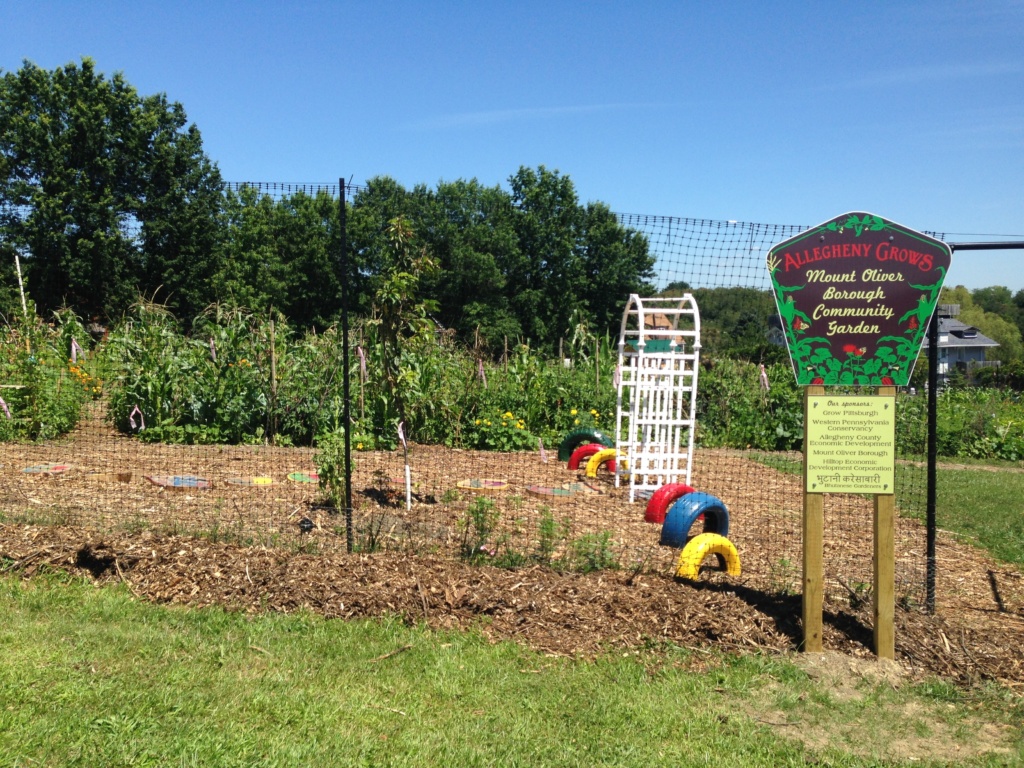Allegheny County has many vacant lots – over 25,000 in Pittsburgh alone.
However, many of these lots are not suitable for vegetable gardening; and many suitable vacant lots cannot be accessed legally. Here is information on how to evaluate a potential site, determine the ownership, and get permission to garden there.

Evaluating a Garden Site
When evaluating vacant lots in your neighborhood, look for lots that fit the following criteria:
- The garden area gets at least 6 hours of sunlight a day in spring and summer.
- The slope of the land is close to level, or gently sloping.
- The garden area is able to support good weed or grass growth. Avoid impermeable surfaces such as asphalt, concrete, or slag.
- The soil has low amounts of heavy metals, particularly lead, which can be hazardous to children and pregnant women. Check our Grower’s Resources for more information on soil testing and Penn State’s guide to Lead in Residential Soils.
In addition, location can make or break a garden. Some considerations:
- Is the garden within sight of at least one residence? Watchful neighbors provide a sense of security.
- Is it accessible for the gardeners? If it is too far or too difficult to walk to, gardeners will be less motivated to maintain their plots.
- Is there wildlife? Deer live in stands of woods. Groundhogs live in holes and vacant houses. Rabbits live in bushes and brush. See Grower’s Resources for tips on managing these pests.
- Is the land currently being used? Ballfields, paths, and turn-arounds can be at odds with gardening.
- Is there illegal dumping? Depending on the extent, cleanup may be resource-intensive.
- Is there water? During the dry months of July and August, it will be difficult to provide sufficient water to keep many vegetables plants alive. You may have to bring in outside water, or plant only drought-tolerant crops.
- What is the condition of the soil? Your soil test will give you a lot of information. Vegetables and herbs need fertile, well-drained soil with a pH between 6 and 7. If your soil is not ideal, before starting to grow plants, you may want to spend a year or two growing your soil first.
Click here, to download the Site Evaluation Form Grow Pittsburgh uses for evaluating sites we work on.
Getting Permission to Garden on a Site
It is important to know who owns the site you wish to garden on. There are two ways to do this:
- Using the County Assessment website, you can find out who the owner is. Note what the mailing address is, and if there are back taxes due. Also notice if the land is made up of multiple parcels.
- GTech’s Lots to Love website and the Western PA Regional Data Center’s Property Dashboard makes it easy to understand the ownership of vacant lots.
Municipally-Owned Lots
The City of Pittsburgh’s Adopt-A-Lot process provides legal access to City-owned lands for greenspace projects such as community gardens and urban farms. Bear in mind that the leases provided through the Adopt-A-Lot process preserve the city’s right to sell the lot while it is actively being gardened. The City of Pittsburgh requires gardeners to provide their own liability insurance for gardening, and Grow Pittsburgh has coordinated a group insurance policy for gardens on City-owned land.
Other municipalities in Allegheny County will have their own processes for permitting residents to use their vacant land. The best place to start is generally the borough or township manager, who will know how to navigate site access.
Privately-owned lots
If you can locate the owner, perhaps you can get permission for gardening on the lot. Or, perhaps the owner would be willing to donate the lot to a local non-profit organization that would give you permission to garden it. (Make sure to check into liens and back-taxes owed on the lot before pursuing this option.)
Whatever your situation, it is crucial to have written agreements signed by all parties. The process of drafting the document will allow each party to express their concerns and ensure that everyone agree to the terms of the agreement. The National Policy and Legal Analysis Network has a very thorough document outlining all the possible clauses that you may want to consider in your agreement. The lease in the NPLAN document is between a landowner and a non-profit 501(c)3 organization. Here is a simpler Sample Form Permission for Land Use that formalizes access for individuals or neighborhood groups to access land for gardening.
